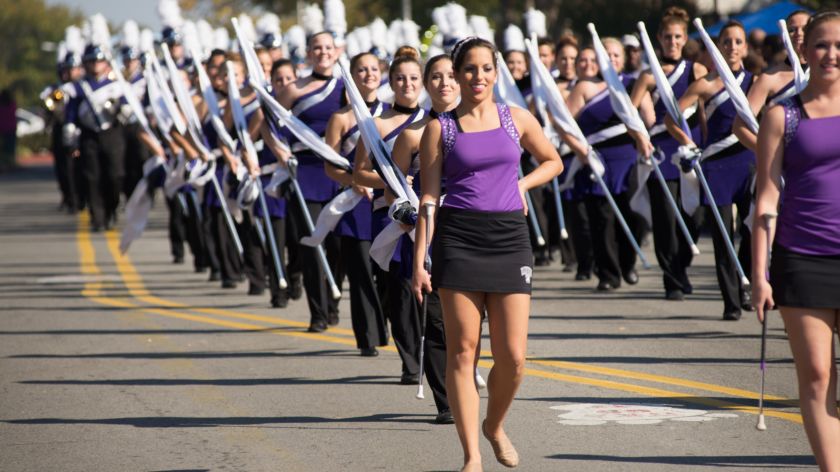Exotic student associations
 Members of a sorority participate in a homecoming parade. Photo: University of Central Arkansas
Members of a sorority participate in a homecoming parade. Photo: University of Central Arkansas
Student associations are known for their unique culture in the Netherlands, but some associations in other countries share certain similarities. A cross-border review: from robot clubs to American football parties.
Austin Howard, history and linguistics Master’s student from the United States
‘To be honest, the things you see in Hollywood movies about American fraternities and sororities are true. They’re named after letters of the Greek alphabet, like ‘Gamma Phi Beta’ or ‘Alpha Phi Alpha’ and are all about drinking, sex and partying. There are exceptions, of course, but members don’t have the best reputations. I finished my Bachelor’s degree in Portland, Oregon. My university was an exception because there were very few student associations. Other universities have more associations with a bigger on-campus presence. They tend to throw huge parties after American football games, because a lot of the members are either players or cheerleaders. Everyone goes to those parties.
In America, you can’t drink on campus because a lot of students aren’t old enough to drink. That’s why most fraternity and sorority houses are located off-campus. Sexism within these associations has been highly publicised in America. Unfortunately, you can see the effects in politics – a lot of politicians were in fraternities, and look how they ended up…’
‘The nazi’s thought fraternities were too liberal’
Ilka Goos, Law student from Germany
‘Most fraternities at my university, the Christian-Albrechts-Universität in Kiel, were founded in the nineteenth century. The members are quite traditional, all men, and often they live together in a house. There is one sorority for women as well, but it seems to me that people take them a lot less serious. Members of fraternities are a minority at my university, ninety percent of the students choose other activities, like sports, hobbies and the student council, instead of becoming a member of a fraternity.
Fraternity members that I know are very nice and polite, but there is a small group that ruins other’s reputation. The extremely traditional groups are often loud and they demand more attention than necessary. The funny thing is that most fraternities were founded by students who wanted to break free from their conservative families and society. That is one of the reasons the nazi’s banned them. They thought they were too liberal. Now, there’s one group who the security services wanted to ban for having too far-right ideas. They are an exception though, other fraternities distanced themselves from this explicitly.’
Alexia Aslan, Erasmus political science student from Brazil
‘As far as I know, we don’t have sororities or fraternities in Brazil. One of the reasons is because Brazil was a dictatorship until 35 years ago. Student associations were known to resist the regime and just being a member could get you arrested. Since the 1990s, students have slowly started to unite in sports and hobby clubs. I’ve always been curious about fraternities and sororities in Western Europe and the United States; being part of an association with a rich history seems like fun.
I study at the University of São Paulo, the biggest university in the country. Student life there is very different from the Netherlands. All of our associations focus on a specific sport or hobby. A friend of mine is in a robot club and she builds robots in her free time. In Nijmegen, I became a member of Karpe Noktem. I was looking for people to play Dungeons & Dragons with, and someone suggested I go to their open night. I think I’m the only non-Dutch student in the association.’
Laura Cleven, history student from Luxembourg
‘I was curious about the infamous Dutch student life. My family is Dutch, but I was born in America and grew up in Luxembourg. Luxembourg doesn’t really have student associations, which is a shame. The first university was only opened fifteen years ago, which means there’s very little tradition. International students tend to stick together there and Luxembourg students tend to hang out with their school friends. That wasn’t really my thing.
I didn’t have a room during orientation week, so I went to the student associations to see what it was like. I didn’t really like Carolus, so I figured I’d see what the competition was like. That’s how I ended up at Ovum Novum. I became a member a year later, when I felt that my Dutch was up to par. I wanted to know what it was like to live like a Dutch person; staying in the international student bubble really isn’t my thing.’
This article was published in Dutch in Vox #8



